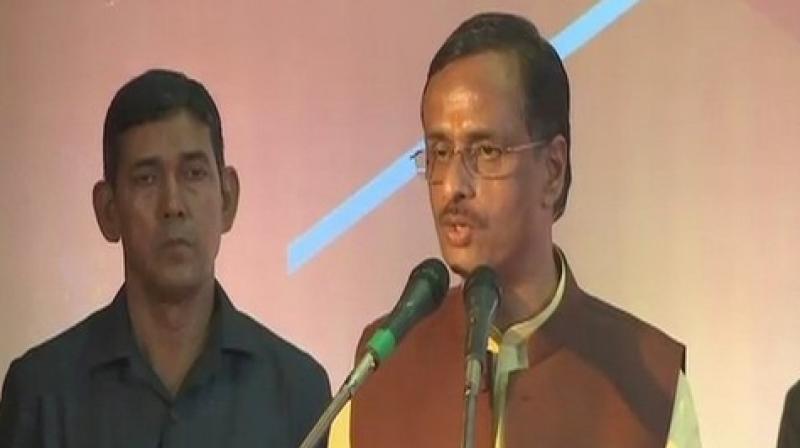Of a Hindu Wakanda' & modern India's dreams
The glory of ancient Hindu science is an essential component of the Hindutva worldview.

We Indians apparently come from a long line of scientists and technologists. Dinesh Sharma, Deputy Chief Minister of Uttar Pradesh, has reminded the nation that Sita’s birth from an earthen pitcher in the epic Ramayan was evidence of an ancient “test-tube baby project”. The ruling BJP has reprimanded him and advised restraint in his public comments. But how many people is the BJP going to reprimand? Tripura Chief Minister Biplab Deb claims that the Internet existed during the Mahabharat period, Baba Ramdev promises an Ayurvedic cure for everything from AIDS to “homosexuality”, and PM Narendra Modi sees in the mythical birth of Karna outside his mother’s womb and the grafting of an elephant’s head onto Ganesh’s human torso proof that modern levels of science and technology were available in India’s ancient past. The glory of ancient Hindu science is an essential component of the Hindutva worldview. In this version of the public imaginary there is a persistent yearning for a “modernity” that was ancient and indigenous, but is now irretrievably lost. This loss is a blow to the collective Hindu psyche confronted with a modernity which is not only Western in origin but predatory and imperialist to boot.
The people of this mythical land — a Hindu “Wakanda” — seem to have flourished within the confines of their geography without connecting with other civilisations. They masqueraded as underdeveloped, malnourished and poor while they successfully melded modern science and technology with the traditions of their ancestors. The glorious period of the “Hindu Wakanda” was predictably before the land which is known as India today was conquered and colonised. The conquerors from outside — whether from Central Asia or colonialists from Europe — obliterated its scientific and technological wisdom. The heroes of the “Hindu Wakanda” are therefore located in myth or in ancient history. Fundamental to the glory of “Hindu Wakanda” was something it possessed in abundance which the rest of the world didn’t — the strongest force in the world, spritualism. In the Marvel Comics fantasy, Wakanda’s source of wealth and power were its rare metal deposits of an imaginary mineral, Vibranium. These deposits were finite. Indian spritualism by contrast was infinite and renewable. The more one mined it, the stronger one became.
Ancient Indians were thus spiritually rich while the rest of the world, without it, was destined to be poor. While the world struggled to find antibiotics and cures for diseases and epidemics, “Hindu Wakanda” had its own version of the “heart-shaped herb” which could revive people from near-death situations — the Sanjeevani Booti, with which Lakshman was revived after he was fatally wounded by Ravan’s son Indrajit. What purpose does it serve the BJP leaders to resurrect this civilisational fantasy repeatedly? In the distorted mirror of the past, the poor and uneducated people of India are shown to have once lived in happier times. It provides a narrative through which the weak can appropriate the symbolically rich techno-scientific utopia by which the Western world legitimises itself and establishes its supremacy. The feeling of being left behind because of the asymmetries in scientific and technological knowledge is sought to be ameliorated by creating a fantasy about the past.
It is not insignificant that this fantasy excludes political and social problems from its frame of reference. It does not tell us what society was like in this age of high science. What rights and access to services did ordinary citizens have in this utopia? Did everyone have access to test-tube births or only Raja Janak by virtue of being a king? Did Lord Ganesh manage to get a head transplant because he was the son of a powerful god, or did ordinary mortals also qualify for transplants? Could ordinary people travel in the “vimanas” designed by the amazing aeronautical engineers of their day? Could citizens vote not to pay taxes unless test-tube births were offered to ordinary women also? Such questions are not permitted in this phantasmagoria.
As in the Marvel blockbuster film Black Panther, fantasising about Wakanda is not about real empowerment. In the Wakanda of Marvel Comics, the people of an African “nation” are empowered not because of their own achievements but because a mysterious and imaginary mineral, Vibranium, was accidentally “gifted” to them when a meteorite struck their land. The story is addressed primarily to an audience of African-Americans and in this simple retelling, the struggle of the American Black Movement is obliterated by the single accident of a meteorite striking the earth. In our real and flawed world, the social, political and economic empowerment of the dispossessed can never be an accident or a technological fix. It requires political awakening and masses of people struggling for it. These movements can and often do fail with tremendous human cost. The Indian equivalent of Vibranium – that is, spritualism — is not going to give anyone equal rights, equal access to justice or ensure equitable distribution of resources.
Empowerment in the real world requires political, social and economic change which a class and caste-ridden obscurantist society will not voluntarily proffer. In grossly unequal societies, there is necessarily a conflict between those who are systematically denied equal opportunities and the dominant elite which concentrates power in itself. If even an iota of the mythical glory that is touted by the BJP leaders again and again is to be achieved in the real world, then those societal flaws will have to be recognised and addressed which prevent millions of Indians from getting basic rights, including access to world-class education, healthcare and social security. A society needs to be free of hunger and poverty before it can produce world-class mathematicians, scientists, astronomers, doctors, surgeons, geneticists, space scientists and social scientists in the here and now. Even when they have had the political opportunity, the Hindutva ideologues have demonstrated a complete lack of ability to address these objectives. Merely substituting fantasies for real action towards a just and equitable society is not going to provide us a blueprint for India’s future.

